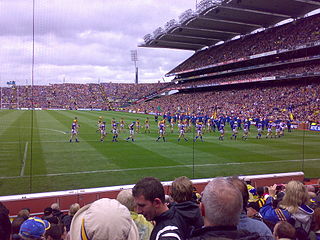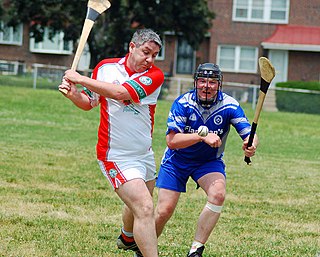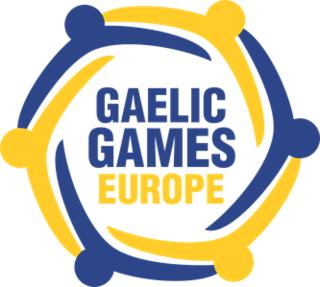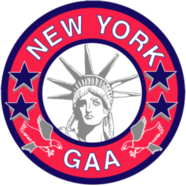
Gaelic football, commonly known as simply Gaelic, GAA or Football is an Irish team sport. A form of football, it is played between two teams of 15 players on a rectangular grass pitch. The objective of the sport is to score by kicking or punching the ball into the other team's goal or between two upright posts above the goal and over a crossbar 2.5 metres above the ground.

Hurling is an outdoor team game of ancient Gaelic Irish origin, played by men. One of Ireland's native Gaelic games, it shares a number of features with Gaelic football, such as the field and goals, the number of players and much terminology. The same game played by women is called camogie, which shares a common Gaelic root.

The Gaelic Athletic Association is an Irish international amateur sporting and cultural organisation, focused primarily on promoting indigenous Gaelic games and pastimes, which include the traditional Irish sports of hurling, camogie, Gaelic football, Gaelic handball and rounders. The association also promotes Irish music and dance, as well as the Irish language and it also promotes environmental stewardship through its Green Clubs initiative.

Croke Park is a Gaelic games stadium in Dublin, Ireland. Named after Archbishop Thomas Croke, it is referred to as Croker by GAA fans and locals. It serves as both the principal national stadium of Ireland and headquarters of the Gaelic Athletic Association (GAA). Since 1891 the site has been used by the GAA to host Gaelic sports, including the annual All-Ireland in Gaelic football and hurling.
The Western Divisional Board of the North American Gaelic Athletic Association (GAA) colloquially San Francisco GAA is the governing body of hurling, camogie, and Gaelic football in the San Francisco Bay Area. It is affiliated to the North American Board.

Kilmacud Crokes is a large Gaelic Athletic Association club located in Stillorgan, Dublin, Republic of Ireland.

The United States County Board of the Gaelic Athletic Association or USGAA, is one of the 3 county boards of the Gaelic Athletic Association (GAA) in North America, and is responsible for Gaelic games in the United States. The county board is also responsible for the United States county teams.

The European Board of the Gaelic Athletic Association or Gaelic Games Europe is one of the international units of the Gaelic Athletic Association (GAA), and is responsible for organising Gaelic games in continental Europe. Gaelic Games Europe is also responsible for the European Gaelic football, hurling, camogie and ladies' Gaelic football teams which compete every three years at the GAA World Gaelic Games.
The St. Louis Gaelic Athletic Club (STLGAC) is an amateur Irish and international cultural and sporting club primarily focused on promoting Gaelic games in the St. Louis, Missouri metro area. The club was founded as the St. Louis Hurling Club, but changed its name to better reflect the club's participation in its two main sports; hurling and Gaelic football.

The New York County Board of the Gaelic Athletic Association, or New York GAA is one of the three county boards of the Gaelic Athletic Association (GAA) in North America, and is responsible for Gaelic games in the New York metropolitan area. The county board is also responsible for the New York county teams.
The history of the Gaelic Athletic Association is much shorter than the history of Gaelic games themselves. Hurling and caid were recorded in early Irish history and they pre-date recorded history. The Gaelic Athletic Association itself was founded in 1884.

Gaelic Games Canada (GGC), or the Canadian GAA (CGAA), is responsible for Gaelic games across Canada, overseeing approximately 20 clubs. "GAA" is the abbreviation for the Gaelic Athletic Association.
The Central Divisional Board of the North American GAA is the governing body of hurling, camogie, and gaelic football in an area centered on Chicago. It is affiliated to the North American Board, and its territory was expanded in 2006 to include Milwaukee. Its headquarters are at Gaelic Park, a custom built facility for Gaelic games in the South side of Chicago. The facility has hosted major tournaments such as the North American playoffs. It hosted the 2007 Continental Youth Championships and the 2007 North American Playoffs.
The Philadelphia Divisional Board of the North American GAA is the governing body of hurling, camogie, ladies Gaelic football, and men's Gaelic football in the Philadelphia metropolitan area. In recent years, the Division has benefited from growth of clubs/teams in Pennsylvania and in the neighboring states of New Jersey and Delaware. It is affiliated with the USGAA North American Board. Its headquarters are at the Limerick Field Complex in Pottstown, Pennsylvania. Until the 2006 North American Convention, its territory included the Washington DC/Baltimore area.
Although many hurling clubs exist worldwide, only Ireland has a national team. Ireland's national hurling team and the Scotland shinty team have played for many years with modified match rules in international composite rules—much like international rules football brings together Gaelic football and Australian rules football. This match is the only such international competition.
The North American Senior Hurling Championship is a competition run by North American GAA between hurling teams from various cities in the United States and Canada. Most teams come from Boston, Chicago, Philadelphia and San Francisco.
The Northeast Divisional Board is a division of the United States GAA (USGAA) covering the Boston Metropolitan Area. It is the largest division of the USGAA, which in turn is affiliated to the Gaelic Athletic Association in Dublin, the governing body for Gaelic games. The Northeast Divisional Board headquarters are at the Irish Cultural Center (ICC) in Canton, Massachusetts, which has hosted USGAA championships and tournaments combining the USGAA and the other two North American GAA affiliates, the New York GAA and the Canadian GAA.
The Hurling Club of Madison is an American amateur sports club based in Madison, Wisconsin, playing and promoting the sport of hurling. Since 2015, the club has also sponsored a Gaelic football team, adding a women's Gaelic football team in 2016. The club is a member of the United States Gaelic Athletic Association, Heartland Division.
The 2016 Etihad Airways GAA World Games was a global competition of Gaelic football, hurling, and camogie run by the Gaelic Athletic Association (GAA), featuring teams from six continents. This was the 2nd GAA World Games and the first to be played in Ireland, with the first ever tournament played in Abu Dhabi the previous summer. The opening ceremony and throw in was held on August 6 at Croke Park, while the majority of the games were held at University College Dublin from 9 August to 11 August 2016, with the finals being played on Friday, 12 August 2016 at Croke Park.









